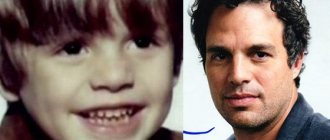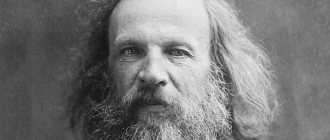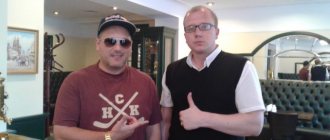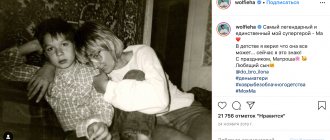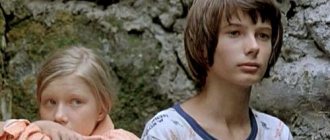Childhood and youth
Vladislav Nikolaevich Listyev was born on May 10, 1956 in Moscow.
His mother Zoya Vasilievna (1934-1996) worked as a copyist at , his father (1931-1973) worked there for a long time, and then got a job at the regional headquarters of the People's Control Committee. Nikolai waited with trepidation for his son, although he was scared: doctors said that childbirth could kill his wife. The obstetricians recommended a caesarean section, but the young mother categorically rejected the offer, for which she almost paid with her life. The baby had to be pulled with forceps. After this, Vlad had noticeable marks on his temples for several years.
Vlad Listyev in childhood
When Listyev was still a schoolboy, his father was sent on a two-year business trip to Africa. His mother followed him. Vlad's godmother, Nikolai's sister, was entrusted with the care of the child. However, instead of two years, Listyev’s parents lived in Uganda for only six months. The hot climate did not suit Muscovites - the head of the family began to have terrible health problems. To Vlad’s great happiness, his parents returned to the capital, and soon the family settled in a cooperative apartment near the Profsoyuznaya metro station.
With Father
He adored Listyev’s parents, and they supported him in everything, endlessly loved and cared for him. When Vlad became interested in athletics, Nikolai Ivanovich did not miss a single competition of his son. And there was something to be proud of: the young man became one of the best students at the boarding school at the Spartak sports society, grew to become a candidate master of sports and even won the title of national champion in the 1000-meter running among juniors.
Vladislav Listyev in his school years
While Vlad was shining on the treadmill, his family was slowly crumbling. There was no respect and love between the spouses for a long time; Nikolai Ivanovich started an affair on the side. But the man had no intention of leaving the family. “For me, there is nothing more important than my son, so I will stay next to him,” said Listyev’s father.
Family
- Father - Nikolai Ivanovich Listyev (1931-1973), was the head of the regional headquarters of the Committee of People's Control, a foreman in the galvanic shop at. At the age of 42, he committed suicide by poisoning himself with dichloroethane[19].
- Mother - Zoya Vasilievna Listyeva (d. Shchelkunova) (1934-1996) - copyist in a design organization on. After retiring, she got a job as a cleaner in the metro at the Kakhovskaya station. On June 30, 1996, at the age of 62, she was hit by a car. She died on the way to hospital No. 7; a high percentage of alcohol was found in her blood[19][20].
- His stepfather (born 1946) was 10 years older than Vlad and abused alcohol and drugs[21][22][23].
- The first wife is Elena Valentinovna Listyeva (Esina village) (born November 7, 1956). They got married in 1977 after Vlad graduated from boarding school; their marriage broke up two and a half years later[19]. The son died after birth[3].
- Daughter - Valeria Vladislavovna Ossetskaya (Listeva) (born March 18, 1981)[24] is a speech therapist by training, works at the Dolores Academy of Hairdressing on Arbat, a specialist in nail extensions. Her father did not take part in her upbringing[25]. Married for the second time, the first husband was a gambling addict.[26] Grandchildren: Anastasia and Bogdan[27].
- Stepson - Nikolai Lyalin (born 1981)[28], from other sources, Nikolai Lyalin and Alexander Listyev are second cousins;
Father's death
His father constantly tried to explain to Vlad that he had no one to count on in life and that he must learn to achieve everything on his own.
As if he felt that he could not be with his beloved son all his life... Another inspection under the leadership of Listyev Sr. almost ended in the closure of the store. The owner hinted at a substantial bribe so that Nikolai Ivanovich would turn a blind eye to the shortage. The head of the family could not resist the temptation. Soon the people above learned about the incident, and a criminal case was opened against Vlad’s father. Nikolai Ivanovich was terribly afraid that the trials would harm his family. He didn’t know how he would look into his son’s eyes, how he would explain his action. Listyev Sr. saw no other way out - only suicide could save everyone from inevitable shame.
Vlad Listyev with his father Nikolai Listyev
Nikolai took the whole package [for ethical reasons we cannot indicate the name] and lost consciousness. The ambulance arrived too late - three days later Listyev Sr. died in the hospital without regaining consciousness. Later, doctors confirmed that such a dose could easily kill ten people.
The journalist's father was only 42 years old. Vlad was in high school at the time, and he was taking his parent’s death seriously—at that time he did not yet know about the reasons for his death. The mother did not grieve for long, and soon brought her drunkard stepfather, who was only ten years older than her son, into the house. The man dragged the poor woman into a series of endless drinking bouts that drove Listyev crazy. It was later that Vlad would drink with them as equals - but for now the guy was decisively packing his things to leave his home.
Education
After graduating from school and serving in the army, Listyev entered the international department of the Faculty of Journalism at Moscow State University. Studying Spanish, French and Hungarian took a lot of energy, but studying gave Vlad only pleasure. Successes at the institute were complemented by the student’s powerful organizational talents - Listyev was the course sports organizer, commanded the “parade” at the autumn potato harvest on the state farm.
Vlad Listyev in his youth
Vlad also did not forget about sports, but family problems (and then he was already married) increasingly undermined his potential. In 1980, Vlad did not make the Olympic team, and plunged headlong into his studies. However, even here a stormy personal life prevented development. His wife’s denunciations about the “traitor Listyev” to the department closed his internship in Cuba.
In his youth, Listyev was involved in athletics
Career breakthrough
Having become a certified “literary television employee” in 1982, Vlad got a job as an editor at the USSR State Television and Radio Broadcasting Company, the country’s main broadcasting organization for 60 years.
Vlad Listyev in his youth
And already in the late 80s the whole country started talking about Vlad Listyev. Having become one of the hosts of the “Vzglyad” program, he instantly turned into a folk hero. Listyev personified grandiose changes within the country, raising within the framework of the program such bold topics as sex, power, the disaster at the Chernobyl nuclear power plant and others, the discussion of which became possible thanks to Gorbachev’s policy of glasnost. The first episode of “Vzglyad” with Vlad Listyev The success of the program was stunning. This prompted Listyev and his colleagues to found their own television, which still produces entertainment programs and documentaries. The television company's logo became a nightmare memory for all those whose childhood was in the early 90s: the ceramic head of the ancient Chinese philosopher Guo Xiang with a toad on his head inspired awe. It is noteworthy that for some this mask resembled the face of Boris Yeltsin.
VID company logo
Since 1991, Listyev was listed as the general producer of the television company, and later he became its president. Vlad not only managed the projects - he wrote scripts for them and acted as a presenter. The years of work of the journalist at VID were headlined by the release of a number of legendary television programs, many of which are still broadcast to this day.
Listyev founded the VID television company
Even before Leonid Yakubovich, who has been offering to spin the drum for the last 30 years, Listyev hosted the capital show for a whole year. Yakubovich was literally a “man from the street” and for a long time refused Vlad’s offer to become a presenter, but in the end he agreed and even suggested changing the concept. So “Field of Miracles” became a program not about words, but “about those who play it.”
Listyev was the host of “Field of Miracles”
The “Tema” program became one of the first on Russian television that could be called a talk show. Listyev hosted it for two years, discussing with guests and viewers the most pressing problems of our time. Later, Vlad was replaced by Alexander Lyubimov and Yuliy Gusman.
“Theme” with Vlad Listyev, 1992
Rush Hour's interview style was copied from Larry King Live, right down to the host's braces. This program, which Listyev hosted for the first nine months, changed the way Russians view television. Many politicians themselves paid to be invited to the studio. According to the recollections of contemporaries, the “tax” for participation in “Rush Hour” was 40 thousand dollars. After Listyev, the show was hosted by a whole army of talented journalists - Dmitry Kiselev, Leonid Parfenov, Konstantin Ernst and even musician Andrei Makarevich.
"Rush Hour" with Vlad Listyev
Another intellectual project of Listyev was the children's program “Starry Hour,” which reveals the talents of children and teenagers. Its host was Sergei Suponev. After his tragic death in 2001, the show was closed. “Smak”: Andrey Makarevich and Vlad Listyev In collaboration with Vitaly Vulf, Listyev launched the “Silver Ball” program, dedicated to outstanding people of art. The program ran for 16 long years and was closed in 2010, a few months before the death of Wolf, its permanent host.
With colleagues from “Vzglyad”
But the entertainment show “Guess the Melody”, although with interruptions, is still on. True, Listyev did not see the triumph of the music show. The first filming, led by Valdis Pelsh, took place two weeks after Vlad’s murder. Despite the success of the programs, Vlad’s workdays were marred by conflicts with colleagues and others. By 1995, Listyev, who had become the number one TV personality, had made many envious people and just enemies. But they never went to showdowns with bandits, like his colleagues - he hated this whole audience.
At the Interview (1992)
Many still believe that Listyev was a weak presenter, but an excellent manager and organizer. He could be tough, he could easily humiliate a person. At the same time, Vlad often caught up with a sobbing person in the corridor and tearfully asked for forgiveness. Nobody understood how it coexisted in one person.
The rise of Russian media
Vlad Listyev was killed
The murder of Vladislav Listyev, one of the most popular television personalities of the era, host of the programs “Vzglyad”, “Field of Miracles”, “Tema”, “Rush Hour” and the general director of ORT, which has not yet aired, occurs against a very unfavorable background, just a few months later after the first high-profile murder of a journalist, Dmitry Kholodov.
Photo by Sergei Kuznetsov.
Since the early 1990s, Russia has become an extremely unfavorable place for journalists to work. At the end of 1993, the International Federation of Journalists recognized the space of the former USSR as the most dangerous on the planet for media work. According to the Glasnost Defense Foundation, from 1992 to 1999, 95 journalists were killed or died under suspicious circumstances in Russia, 26 of whom were in Chechnya. “Since the early 1990s, an alarming syndrome has emerged in the development of the five G20 countries,” notes the report of the International Federation of Journalists. “They are rated differently on the press freedom index, but in Brazil, India, Mexico, Russia and Turkey, the killing of journalists largely goes unpunished. One country in this group is showing signs of change. Of the 19 murders of journalists in Turkey, only two occurred after 2000. In the other four countries, little has changed. And the situation gets worse the longer criminals, politicians, military and intelligence agencies can kill with impunity those whose investigations and publications threaten them, or those whose views they simply do not like.” 1
On the day of his death, Listyev goes on air with the program “Rush Hour” with the following words: “Good evening. Today 'Rush Hour' is live. Today is March 1, and I congratulate everyone on the first day of spring and on those hopes... Each of us associates many hopes with spring. And as you know, hope always dies last.”
He is killed in the entrance of a house on Novokuznetskaya Street with two shots, leaving a large sum of money untouched.
The murders of Dmitry Kholodov and Vlad Listyev shock society; tens of thousands of people come to their funeral. After the murder of the presenter, all channels stop broadcasting, except for news programs, and the screensaver “Vladislav Listyev is killed” appears on the screens. There are loud accusations from the journalist community. “The murder of Vlad Listyev is your shame, Mr. President, your shame, gentlemen parliamentarians, this is evidence, if not of your involvement, then of indifference, lack of will, inaction,” says Vladimir Pozner in those days.2
Kommersant is collecting public reactions. “And although the head of the information department of the presidential administration, Sergei Nosovets, warned 'fellow journalists against emotional accusations against the authorities, in particular the president,' such accusations quickly followed from journalists and others,” the newspaper notes. — For example, Deputy Speaker of the State Duma, Deputy Chairman of the Liberal Democratic Party of the Russian Federation, Alexander Vengerovsky, spoke in favor of the resignation of the Minister of Internal Affairs of the Russian Federation Viktor Yerin, in an interview with Interfax. And the chairman of the State Duma Security Committee, Viktor Ilyukhin, considers “very real” fears that Listyev’s murder “could be used by the executive branch to unleash mass repressions.” He believes that the current government, more corrupt than ever, is unable to fight crime, and there is only one way out - changing the government, as well as the political and economic course. The demand for the resignation of the heads of the power ministries was also expressed by participants in the press conference of Russian media leaders, including the head of the TV-6 channel Eduard Sagalayev, member of the presidential council Alla Yaroshinskaya, editor-in-chief of 'Evening Moscow' Alexander Lisin and others. The former head of the Ostankino television company, now the editor-in-chief of Obshchaya Gazeta, Yegor Yakovlev, called the appointment on Thursday at a meeting of the Russian government of Internal Affairs Minister Viktor Erin, who, in his opinion, is “directly connected with the criminal revolution in our country'. “The police and Minister Erin cannot protect this society,” said Oleg Poptsov. Vecherka editor-in-chief Alexander Lisin said that the murder of Vladislav Listyev "is beneficial to those who want to introduce a state of emergency in the country and extend the powers of the State Duma and the President of the Russian Federation indefinitely." He believes that it is necessary to demand from the authorities “that without introducing a state of emergency, people come who can, in accordance with the law, restore order in the country.” He was also supported by the first deputy editor-in-chief of Izvestia, Anatoly Druzenko: “The main danger is that the forces that want to set about ‘restoring order in the country’ are trying to create the impression that a longing for an iron hand is brewing in society.”3
Journalists at Ostankino are having a discussion.
Newspapers write about the atmosphere of fear that has arisen not only in society, but even in the Kremlin. “Immediately after the news of the death of Vlad Listyev, many officials who were directly related to the coordination of state policy in the field of television (and those who were associated with the distribution of the package of fiscal benefits, public sector orders, privatization and other bread-making activities) were seized by natural panic,” O. “Those who just yesterday believed that a pass to the Kremlin meant a carefree life and confidence in the future, today rushed around among friends in search of a new place of residence, asked to live with someone outside the city, wanted to hide with their family abroad. The murder of the general director of ORT JSC was clearly regarded by the new Russian elite as a demonstrative threat and warning to clearly non-state actors. Everyone who has something to lose and something to share has mentally tried on a wooden tailcoat. Neither the strengthening of personal security (for example, ORT directors were allocated cars with bodyguards at the expense of LogoVAZ), nor the presence of an incredible amount of gas and firearms for civilians, calmed the soul. <…> According to the confessions (albeit confidential, always with the phone turned off and without witnesses) of the functionaries themselves from the presidential and government sidelines, the all-powerful offices of Mr. Barsukov and Korzhakov are doing anything but protecting the nomenklatura 'ordinary'. <…> But the ranks of the self-defense of LogoVAZ, Menatep, Soyuzkontrakt, Most Bank and many other giants of economic influence that are gaining strength have strengthened quite well.”4
And, if after the murder of the MK journalist the president was reproached for not honoring his memory, now, after the murder of the TV journalist, Yeltsin comes to Ostankino and seems to have difficulty finding words.
Later, presidential press secretary Vyacheslav Kostikov would write in his memoirs:5
This day was particularly memorable for me also because, together with the president, I went to the Ostankino television studio, where Boris Nikolayevich was supposed to express his sympathy to the staff regarding the murder of the famous television journalist Vladislav Listyev. A sad procedure into which the president unexpectedly intertwined politics. Since the morning, the usual preparations for the presidential departure have been spinning. The Security Service was involved, the route was cleared, the details of the “protocol” were clarified. The press service provided a live broadcast. There was no preparation for a big presidential speech. They believed that he would simply say words of sympathy and condolences.
I remember how literally a minute before leaving I had a short conversation with Yu. Baturin. Knowing that at the television studio I would see A.N. Yakovlev, the then chairman of Ostankino, he asked me to talk with him about a candidacy for the post of Prosecutor General. Baturin was very alarmed by the prospect of A. Ilyushenko being approved for this post. Despite the resistance of parliament, A. Korzhakov powerfully “pushed” him to the post of Prosecutor General. This caused an extremely negative reaction in society. As you know, A. Korzhakov achieved his goal, the president signed a decree on the appointment and... once again tragically made a mistake in his choice. Yu. Baturin's fears were fully justified.
But on that day there was still hope to prevent this appointment. I asked Yu. Baturin who, in his opinion, could be a worthy candidate. He took a notepad out of his pocket and wrote his name on the paper. He did not dare to speak out loud. This was already the situation in the Kremlin at that time.
Unfortunately, that day I was never able to talk with A.N. Yakovlev. Hoping to arrive at Ostankino before the president in order to meet face to face with A. N. Yakovlev, I left ahead of time, but despite all the “flashing lights” and “nozzles” of the car, I ended up in a terrible traffic jam on Mira Avenue. I arrived at the television studio literally a few minutes before Yeltsin’s motorcade, which was walking at high speed along the “cleared” highway.
Moscow was shocked by Listyev's murder, the television was seething, and I feared that there might be unfriendly shouts during Yeltsin's speech. But my fears were in vain. With his characteristic intuition, the president found the right tone and very skillfully structured his speech. He was gloomy, sincere, and even demonstrated an unusual repentance, saying that Listyev’s murder was also his fault, that, as president, he was responsible for the safety of the population.
Clearly realizing that television would spread his words throughout the country, Yeltsin unexpectedly launched angry accusations at the Moscow authorities and, in particular, at those responsible for order and security. It was like the first act of a presidential performance played for Luzhkov. The president’s speech actually predetermined the resignation of the Moscow prosecutor and the head of the capital’s Main Department of Internal Affairs, who were considered Luzhkov’s “people.” Yu. M. Luzhkov later recalled that on that morning, during a meeting in the Kremlin with the president, there was no conversation about these resignations. According to aides, the president made the decision on the way to Ostankino in the car, possibly under the influence of A. Korzhakov.
Boris Yeltsin and Alexander Yakovlev in Ostankino after the murder of Vladislav Listyev. A frame from the “Time” program dated March 2, 1995.
And the previous, before Listyev, head of Channel One, ideologist of perestroika, Alexander Yakovlev, writes about those days in his memoirs, published in 2005:6
During the period of corporatization, trouble happened at Ostankino. They killed Vlad Listyev, a talented journalist who had just been appointed general director of a new company called ORT. The event made a stunning impression on the public. Many television channels stopped broadcasting. From morning to evening there is a portrait of Listyev on the screen. During these nervous days, I felt especially acutely my mistakes in personnel policy. Some television bosses, with outside support, intensified the situation in every possible way. Secretly from me, they prepared a program for broadcast, full of hysteria, which emphasized, first of all, the president’s guilt in Listyev’s death. I found out about this program at the last moment before the broadcast. I managed to talk with the presenter Sergei Dorenko and ask him to tone down the planned hysteria if possible. I must say, he did everything possible to calm the bazaar. It seemed that it was beneficial for someone to divert public attention away from the real culprits of the tragedy.
In this extremely tense atmosphere, the president of the country arrived at Ostankino. I took the opportunity and asked Yeltsin why the decree on the fight against fascism had not yet been signed. He turned to his assistant Ilyushin and asked him what was the matter. He replied that the Academy of Sciences has not yet given a scientific definition of fascism. Soon the decree was signed, but law enforcement agencies openly sabotaged it.
Yeltsin was clearly not in a good mood. When he came up to the microphone, it was clear that it took a lot of effort for him to speak. The audience also took unjustifiably aggressive positions. There was no contact with the audience. The bias of the journalists was obvious, I believe, pre-arranged. Yeltsin, in front of those present, and therefore the entire country, signed decrees on the dismissal of two heads of Moscow law enforcement agencies, which did not reassure the audience.
As the head of Ostankino, I was accused of not showing the necessary sensitivity because I refused to interrupt television broadcasts in protest against the murder. However, I am still sure that Listyev’s murder was not connected with his journalistic activities. I was also alarmed by the fact that some television and near-television workers were clearly in a hurry to put forward different versions, artificially tied to television, say, an advertising version, as if blocking other options for the reasons for the murder. However, the investigation has not yet been completed.
“Komsomolskaya Pravda” immediately after the incident talks about Listyev’s big plans to reform the news service - ITA, the Information Television Agency, which appeared on the channel after the 1991 coup and closed the “Vremya” program. However, in December 1994, even before Listyev’s appointment, “Vremya” returned to the air of Channel One, but Listyev assumes that from April 1, 1995, “News” will be broadcast in large volumes every three hours during the day. “Listyev’s new program, ‘Crossfire’, jointly with Lyubimov, was preparing for release,” writes Komsomolskaya Pravda. — The dismissal of many editors producing and leading ITA was expected. A whole staff of new people had to come, which no one liked. Lately, Listyev has been leaving the ITA corridors, according to witnesses, as if he had been spat upon. And a few days ago it became known that an order for the dismissal of Nepomnyashchiy (director of ITA) was ready, Voskoboynikov from Interfax was expected to take his place, and the name Kostenko appeared. Nepomnyashchy and Berezovsky (director of LogoVAZ, deputy of A. Yakovlev, one of the main people now on TV) were dissatisfied with Vlad’s plans, his shoveling of the television broadcasting grid from April 1, the recruitment of “his” team, capable of re-dividing the already cut pie - Ostankino '. And finally, former ITA presenter Irina Mishina said that in May 1994, the head of the Main Directorate of Criminal Investigation of the Russian Federation, General Kolesnikov, gave her an interview in which he stated that Vlad turned to them for help - “there were problems with personal safety.” The criminal investigation department seemed to have sorted out Vlad’s problems then, but couldn’t they have appeared again?..”7
However, despite Listyev’s great journalistic talent, already in the first days of March 1995, few people connect his murder with his profession. The first versions concern plans to reform both the entire Ostankino TV channel, the corporatization of which the press has been writing for so long, and its advertising policy.
On February 17, Listyev signed an order to suspend advertising on ORT from April 1; on February 20, the decision was supported by the ORT board of directors. The Segodnya newspaper calls the incident “a purely advertising murder in the fight for money on TV.” “ORT JSC was supposed to begin real activities on April 1,” writes newspaper journalist Igor Dvinsky. “In the meantime, the management of the joint-stock company began to rake out the 'Augean stables' of Ostankino. The biggest criticism, without a doubt, was caused by the advertising service on the TV channel. Last year, in order to somehow streamline the flow of advertising and centralize the profits received, the Advertising-Holding consortium was created on the TV channel. According to the head of Ostankino, Alexander Yakovlev, after its organization, the amount of financial receipts increased sevenfold. Consequently, previously huge amounts of money on the TV channel flowed into the bins of the powerful 'advertising mafia', which was not very secretive. By the way, even after the start of Advertising-Holding's work, the channel's management failed to optimize the scheme for centralizing financial resources received from advertising activities. Seeing that corruption had penetrated too deeply into the commercial mechanisms of Ostankino, on February 17, the Board of Directors of ORT decided to introduce a moratorium on the broadcast of advertising on the TV channel from April 1 in order to completely change the concept of forming packages of orders for advertising and the scheme for accounting for financial revenues from this type of activity. The management of the joint-stock company decided to create a mechanism on the TV channel that would completely isolate corrupt structures and various lobbying groups from any influence on the formation of advertising policy. Moreover, if previously Ostankino did not have its own “advertising doctrine” and followed the lead of various advertising clans, now the company decided to determine for itself what advertising and how to give on the channel.8 The author of the article recalled that the shareholders of Advertising Holding" there were well-known advertising agencies: Premier SV, owned by Sergei Lisovsky, Video International, LogoVAZ-Press and others, and the decision of the board of directors of ORT to introduce a moratorium on advertising "made it clear that the days of 'Advertising-Holding' numbered." In the next issue, the newspaper reports that the investigation is also considering other versions - about “a certain force”, which “it was beneficial to once again destabilize the situation in the city and discredit the government, once again showing its helplessness, turning into hysteria,” as well as “a banal reason ”, which “is based on purely personal, sometimes difficult, relationships between Listyev and his close acquaintances.”9
A few years later, Kommersant wrote about Mikhail Lesin’s weight in the advertising business at this time. “When ORT temporarily suspended advertising and the question of who would receive carte blanche after three months was in full swing, it was Lesin who gathered 17 heads of advertising agencies into Video International and 'strongly advised' them to support Premier-SV,” the newspaper noted. — The corresponding letter was signed. <…> having an exclusive on Russian television and a good position on NTV, Lesin did not take aim at Channel 1: “All others will unite against one, and the entire advertising business system will collapse.”10
Komsomolskaya Pravda also revealed details about the situation with advertising on Channel One in those days. “It is known that on Channel One there was a certain system of advertising activities on air, in which advertising producers and agents dictated to the management of Ostankino what and how to do,” the newspaper notes. — The advertising monopolist on Channel One was a consortium of advertising agencies 'Reklama-Holding' (founders: 'Premier SV', 'Maxima', 'Oster', 'LogoVAZ-press', 'InterVID', 'Video International'). This consortium, renewing the exclusive contract with the channel every quarter, bought all the advertising time from Ostankino, and then, acting as an intermediary, sold the airtime to its clients and other agencies - at retail and at a higher price. When the Advertising Holding consortium was established in the summer of 1993, many regarded it as a salvation for the impoverished channel. In addition, before the advent of the consortium, most of the sales of advertising time were carried out by the program editors themselves, as a result of which the channel’s huge funds were squandered and ended up in someone’s pockets. But according to various expert estimates, throughout last year Ostankino charged amounts for its advertising time that did not correspond to its real market value. The income of the first channel could be 15-30 percent higher. Naturally, this state of affairs could not suit the new founders of ORT, and they courageously decided to update the advertising concept of the channel to the ground. As a result of the negotiations, a new large association of advertising agencies emerged, the Independent Information and Advertising Alliance (NIRA), which included the agencies Aurora, InterVID, Video ART, Contact, and Strong. NIRA easily bought out Ostankino's share, which was another confirmation that Advertising-Holding would soon be liquidated. And recently there has been a competitive and price war between advertising whales. Wanting to exit by the end of March with minimal losses, Advertising Holding began increasing discounts to its clients. NIRA followed his example. As a result, today you can get a 75 percent discount for advertising on Ostankino. This price war led to the destabilization of the Russian television advertising market and showed that Ostankino's Bolivar could not stand two. The new management of ORT from the very beginning began to support NIRA and its concept of organizing sales of advertising time.”11
The newspaper cites unnamed experts who estimated all ORT advertising time in 1995 at approximately $170 million.
For Svyatoslav Fedorov, who immediately expressed his opinion to Kommersant, the advertising version was “unconditional.” “Digest the information that Alexander Yakovlev gave,” Fedorov advised the journalist. — He said that advertising on Channel One generates 35 billion monthly, and 30 billion of them go somewhere, and he cannot find them. The one who has these 30 billion and wants to have them in the future, organized all this.” At the same time, the killers also “wanted to show the same LogoVAZ that if he doesn’t start sharing, the same will happen to him.” “Remember: they also wanted to remove Berezovsky, but it didn’t work out,” he continues. – And that’s why he lives somewhere in Vienna, I almost never see him here in Moscow. Or take the same Most Bank: Gusinsky also violated something somewhere, touched some, you know, government structures - and now lives in London, he is not here.”12
However, some television professionals do not believe in the version about the connection between the murder and advertising. “I don’t believe that Vlad was killed because of his new work at ORT,” TV-6 creator Eduard Sagalayev told Kommersant at the same time. — Because he had no direct relation to the decisions that were made regarding advertising on Channel One. People who work in the advertising business know very well the mechanism for making the well-known decision to ban advertising from April 1. They know both the initiators and founders. And they understand perfectly well that Listyev was far from making this decision. And if these people wanted to cancel the decision made on advertising, they would hardly do it, right? They are not fools, they understand everything perfectly... <...> I believe that this is a political murder. This means that there are certain forces in society that do not want to allow the existence of public television in Russia. They don’t want to allow the existence of a channel that is being organized, which is largely focused on the current president.”13 However, years later, Sagalayev changed his mind. In an interview with YeltsinMedia, he spoke about the “unconditionality” of the advertising version for him. “I just know some things that confirm that I’m right,” he said in an interview. “I know that the advertising money was in a certain bank, and, as it turned out, the bank belonged to the “roof,” that is, the lads. And when the money stopped coming, they had only one option - to punish someone.”
Mikhail Poltoranin said in those days that the murder was connected with the corporatization of Channel One. “I warned the Berezovsky-Tarpishchev-Boiko group that their idea of creating ORT on the first channel was an adventure, moreover, it was hastily worked out and that this new redistribution of Ostankino property could lead to a series of aimed shots,” the chairman of the Committee on information policy and communications of the State Duma Mikhail Poltoranin. – It seems to me that Listyev’s death is the first cruel signal. It’s a pity that the brilliant television journalist Vlad Listyev, who agreed to become the executive director of ORT, found himself at the forefront of the struggle for the division of the airwaves and everything around it: the old mafia near Ostankino will not give up such a fat piece as Channel One without bloodshed.”14
A fragment of the Komsomolskaya Pravda strip after the murder of Vladislav Listyev.
One of the first people publicly accused of murder in the press was Boris Berezovsky. On March 4, he and Irena Lesnevskaya recorded a video message to the president (the text is available at this link). And years later, Berezovsky recalled that situation like this:15
I am convinced that Vlad Listyev was removed by the special services because I did not obey them. And they tried to blame me for Listyev’s death. They wanted to hit two with one shot. The FSB comes up with the idea that I stole half the country and that I am a murderer. <…> In 1994 there was an attempt on my life. Naturally, I turned to law enforcement agencies. Personally, President Yeltsin, in my presence, gave instructions to the Minister of Internal Affairs Erin (Stepashin was then the head of the FSK) that the matter needed to be brought to an end. Nothing has happened in all these years! Over all these years, only I became a “bandit”, instead of looking for the bandits who organized this explosion.
Now about Vlad Listyev. I tried to draw attention to this story because the killers are known. This story, unfortunately, is directly related to what happened to me in 1994, when an attempt was made on my life. As expected, there was an investigation, there were people who conducted the investigation, with specific names, and two months later these people disappeared. They appeared already in 1995, in mid-February, six months after the explosion occurred. Two employees of the Ministry of Internal Affairs came - Major Sergei Lvovich Kozhanov and Nikolai Konyaev, an employee of the same district department of internal affairs. People came who “investigated” my case, saying that they, in principle, managed to find someone who knows how this happened. They came with a member of an organized criminal group, Nikolai Alexandrovich Plekhanov, and said: “Boris Abramovich, you don’t want what happened to happen again?” I say: “Well, naturally, I don’t want to.” - “Now, Mr. Plekhanov knows how this happened, he again has an “order” for you, and we are ready to help you prevent this from happening.”
Taught by bitter experience over these six months, knowing how our services work, I naturally said that yes, I was interested. I was asked to pay 500 thousand rubles to prevent this from happening again.
It turned out that this man is a thief in law, such a strange company. And he offered me information about who did this and who is going to make an attempt on my life again, for a certain amount of money. I turned to my security service and asked that all the following conversations and the process of transferring money to this person, which took place in the presence of employees of the Ministry of Internal Affairs, be recorded on video and audio equipment. On February 28, 1995, I handed over 100 thousand dollars to Plekhanov on record in the presence of these same policemen. I handed over the video and audio recordings to the FSB against signature, absolutely officially.
The next day, March 1, I flew as part of the Russian delegation along with then Prime Minister Chernomyrdin to London. And in the evening I received a message that Vlad Listyev had been killed. I immediately returned to Moscow on a charter flight at night. And that same day in the evening, following a special telegram received from above, a search was carried out in my office.
I cannot assume (I am familiar with the theory of probability) that these are random things: on February 28 I handed over the money, on the 1st Vlad Listyev was killed, on the 2nd the police department officers arrived with an attempt to organize my transfer to the police. I'm sure this is the work of the secret services. I have no doubt that there is a direct relationship between these circumstances (that police officers came to me, extorted money and forced me to give money to the criminal). And if I had not made the video and audio recording, I am sure that I would have been accused of the murder of Vlad Listyev.
I wrote a lot of statements about this, a lot of papers, including to the investigator who is leading Listyev’s case, and to many others. He also addressed the former Minister of Internal Affairs Kulikov; addressed the former heads of the FSB, indicating specific data, names, facts, presenting video and audio recordings... Zero reaction, zero! Criminals are on the loose. Because I have physical evidence that they are criminals: they are extortionists, they took a bribe, they tried to organize and fabricate a case against me for the murder of Vlad Listyev. Behind this whole case (I mean behind the case of the murder of Vlad Listyev) are the special services, and above all Mr. Barsukov and Mr. Korzhakov. I made this statement several times - no reaction. No reaction from them, no reaction from law enforcement.
During the same days, accusations were made against one of the advertising kings, Sergei Lisovsky. The Russian Advertising Council holds a press conference, at which Lisovsky says the following (Komsomolskaya Pravda, from which the text is quoted, notes that this quote is “almost verbatim”): “For me, this is an event in personal, not public life. 'VID' and 'LIS'S' were equally disliked by officials. Especially because we could do without them. In our country, an independent person is always under attack, and many people are not happy with the independent media in connection with the upcoming elections.”16
Mikhail Leontiev discovers an unexpected intrigue around Listyev’s murder on the pages of Segodnya - he writes a column in defense of Yuri Luzhkov, trying to explain to the president that he is being “dragged” into “banal commercial squabbles.” He believes that after the subsequent resignations of Moscow prosecutor Gennady Ponomarev and the head of the Central Internal Affairs Directorate Vladimir Pankratov, “the head of the Moscow RUOP, Mr. Rushailo, is also ‘out’, and “the main target of this purge is Moscow Mayor Yuri Luzhkov.” Leontyev writes about the campaign against the mayor of Moscow, the organization of which is attributed to Mikhail Poltoranin and Alexander Korzhakov. “The most terrible charge against the mayor is presidential ambitions,” he writes, assuring that Luzhkov has no chance of winning the presidential election because he is a “ Moscow mayor.” And he continues: “The initiators and real leaders of the anti-mayor campaign are two large Russian businessmen: Mr. Berezovsky, the head of LogoVAZ, and Mr. Boyko, the owner of Albee and the National Credit Bank. <…> Mr. Berezovsky openly boasts that during the investigative actions he “called the right people” and Moscow investigators were put in their place. <…> So to speak, the 'political' ambitions of both businessmen are motivated by very serious commercial interests: redistribution of markets, seizure of budget funds, government contracts, Aeroflot accounts, etc., ultimately control over officials making decisions fraught with multimillion-dollar dollar profits.”17 “Regardless of who killed Vlad Listyev, his ‘case’ obviously serves as yet another pretext for a commercial showdown carried out at the hands of the president,” he continues. “At the current stage, there is a personnel purge of Moscow law enforcement agencies, which has nothing to do with the specific professional qualities of the victims of this showdown. Next up is the Moscow mayor. If earlier the president could rely firmly on Moscow at critical moments, now he, presumably, is going to rely on the proteges of the Security Service and its commercial sponsors. By driving the president into senseless wars with specially invented political opponents, these people are pushing towards self-destruction and political suicide. It would be a shame if the reason for the political suicide of the first president of Russia was a banal commercial showdown.”
On March 20, economist Pavel Bunich speaks in the “Rush Hour” program (after the murder of Listyev, it is alternately hosted by different TV presenters) about the political background of the murder of Vladislav Listyev, about the struggle between financial groups in Moscow and the federal center, about the deterioration of the country’s economic prospects before the presidential elections in the Russian Federation, about the reasons bankruptcies of privatized enterprises and ways to prevent them, unemployment in Russia, protecting people's savings from inflation, the features of the banking system, the level of foreign exchange rates and the provision of financial assistance to the former republics of the USSR.
Over the years since the murder, many versions of what happened have been heard, but the crime has never been solved. Leading television figures of the era, interviews with whom have already been published in the YeltsinMedia project, expressed, however, doubts about the most common - advertising version of the crime. “As you know, there were a lot of conversations about who could have done this,” noted the first CEO of Video International and famous television producer Pavel Korchagin. — And there were great suspicions related to advertising, among other things. Because during his reign there was an attempt by Berezovsky to change the advertising market (the owner of the company, Channel One, was Berezovsky) and to remove two main players: Lis'S and Video International. Was this the cause of his death? There was a lot of fortune telling. And, let’s say, the same [one of the founders of Video International Yuri] Zapol was repeatedly summoned for various interrogations. But, if something was related to the advertising business, then I would probably know. There was probably another reason."
One of the creators of ATV, Anatoly Malkin, also doubts that the redivision of the advertising market was the reason for the murder, an interview with whom is published in this issue of YeltsinMedia. “Television never understood who it gained, who it lost, and how to continue living,” he says. - To be serious, it was what killed him - television, which did not want to change. And the second thing that killed him was his pride and waywardness. He didn’t want to obey, he wanted to decide for himself, and when they at the top realized who they had installed, they didn’t know how to get rid of him. Television has always been a means of power. Vlad, of course, fell into very serious millstones. But to say that Berezovsky did it? Not really. It is quite possible that this is just a case. They may have collided with someone. But it is significant that precisely on the eve of his coming to power - and he already said that in two months there would be another television - he was shot. The system sensed danger. <…> You, like any journalist, want specific names. But they are not there. And there can be no surnames here. Yes, he declared a moratorium on advertising, and then advertising was in the hands of you know who. But to connect so directly that you declared a moratorium, and we are for it? Nobody shoots because of this, people somehow come to an agreement. No, it was some kind of accident."
One of the creators of Ren-TV and the ideologist of the corporatization of the first channel, Irena Lesnevskaya, also doubts the advertising version (she has already given an interview to YeltsinMedia, and it will be available to readers in future issues). Lesnevskaya says that she publicly defended both Boris Berezovsky and Sergei Lisovsky from charges of ordering a murder, “because I didn’t believe that he was such an idiot.” “The first one who came to mind was Lisovsky with advertising,” she said. - It was ridiculous. Vlad had nothing to do with this at all. He did the voiceover, that's all. I knew that they had already agreed on everything there.”
One of the founders of NTV, Igor Malashenko, called the murder an “absolute mystery.” And he added that he had an “eccentric hypothesis” that he would not express.
Read about the corporatization of the first channel and the transformation of Ostankino into ORT in the next issue of YeltsinMedia.
Read other longreads of the project.
Read the project interview.
The entire chronology of the project.
Read interviews with the author in other media.
Tweet
- International Federation of Journalists “Partial justice. A study of the deaths of journalists in Russia, 1993–2009.” Belgium, 2009.
- Pozner, Vladimir. "The last 'sorry'." "Komsomolskaya Pravda", March 3, 1995.
- Shpagina, Marina. “Vladislav Listyev. Reaction". "Kommersant", March 7, 1995.
- Valabuev, Evgeniy. “The reaction of the Kremlin gods to the murder of Vlad Listyev is panic and fear for one’s life.” "Komsomolskaya Pravda", March 11, 1995.
- Kostikov, Vyacheslav. "Romance with the President." "Vagrius", 1997.
- Yakovlev, A. N. “Twilight: [Reflections on the fate of Russia].” Mainland, 2005.
- Without a signature. “He contacted the police.” "Komsomolskaya Pravda", March 2, 1995.
- Dvinsky, Igor. “Pure advertising murder,” Segodnya, March 3, 1995.
- Sanin, Grigory. "Business? Policy? Personal accounts? "Today", March 4, 1995.
- Plotnikova, Tatyana; Kutsillo, Veronica. "At first sight. Flying from shadow to shadow." "Kommersant", October 5, 1996.
- Without a signature. “It seems that Vlad Listyev was killed by money.” "Komsomolskaya Pravda", March 3, 1995.
- Shvyrkov, Georgy; Chernakov, Andrey; Klin, Boris; Romanov, Vladimir. "Reaction". "Kommersant", March 7, 1995.
- Right there.
- Without a signature. "Killed by a point-blank shot." "Rossiyskaya Gazeta", March 3, 1995.
- Berezovsky, Boris. Edited by Yuri Felshtinsky. "Self-Portrait, or Notes of a Hanged Man." "Tsentrpoligraf", 2013.
- Bakushinskaya, Olga. “Advertisers are ready to pay for a new detective video.” "Komsomolskaya Pravda", March 4, 1995.
- Leontyev, Mikhail. "LogoVAZ took Moscow." "Today", March 7, 1995.
General Director of ORT
At the beginning of 1995, Vlad left VID to take the post of general director of the new ORT television company (since 2002 Channel One).
They say that Boris Berezovsky, who was on the board of directors of the television company, chose Listyev for one reason: of all the candidates, he was the only one who had the titular fifth point. The fact is that the content of the “nationality” column (the notorious “fifth point”) in the documents of many television company managers at that time differed from the titular nationality in Russia. Having taken up his new position, 38-year-old Listyev immediately launched serious reforms in the company’s policy. In particular, he approved a moratorium on advertising on ORT. So he tried to fight against the association of advertising companies that controlled the placement of all advertising on the TV channel.
“Short Encounters” (1994) In connection with the appointment and transformations on the channel, threats rained down on Listyev. But Vlad was not going to change his positions, although he was squeezed from all sides. He did not respond to anonymous calls, did not hire bodyguards - he believed that everything would work out. And I was sadly mistaken. But more on that later.
First wife: Elena Esina
The journalist met his first wife, Elena Yesina, at a sports training camp: after being assigned, Vlad ended up in the same athletics group with her. In 1977, the lovers got married.
Elena Esina and Vlad Listyev got married as students
Listyev was madly in love with Lena. Perhaps they would not have divorced after 2.5 years, but the man could not stand the endless scandals. Problems began after the death of their first child: he was born too weak and died three days later. It is believed that after the tragedy, Elena developed schizophrenia.
His wife’s second pregnancy did not stop the journalist from leaving the family. After another scandal, he ran away from the apartment in the middle of the night - he came to his mother in what he was wearing, in slippers and sweatpants. Elena began writing complaints to the Komsomol and the university, but Listyev did not want to return to his wife and newborn daughter.
Elena Esina with her daughter Valeria
He never wanted to see his daughter - he doubted the authenticity of his paternity. Valeria grew up without a father, trained as a speech therapist, but today she works outside of her specialty - she does manicures in a salon on Arbat.
Valeria Listyeva in the “Battle of Psychics”
The general public became acquainted with Lera thanks to the program “Battle of Psychics,” to which the girl turned herself. While filming an episode dedicated to the mystery of Listyev’s death, she met ex-vsglyudovka Evgeniy Dodolev, one of her father’s good friends.
Personal life
Vladislav met his first wife, Elena Yesina, at sports training while still an athlete. Lena also participated in athletics. Vlad instantly fell in love, and soon the couple got married. Then the first-born was born - a weak boy who did not live even a day.
Elena suffered a severe nervous breakdown and began to behave aggressively with her husband. And Vladislav, they say, began to look at other representatives of the fair sex. In the end, despite the birth of their second child, the couple separated.
Listyev did not communicate with his daughter Valeria. The TV presenter doubted his paternity, although the journalist’s relatives and friends noted the strong similarity between the girl and Vlad.
Vladislav Listyev and Tatyana Lyalina
Published by Elena Kim Thursday, May 10, 2020
Vladislav Listyev and Tatyana Lyalina
The second chosen one of the journalist and presenter was his colleague Tatyana Lyalina. The young people met at the university. Unfortunately, this marriage was not happy either. The couple married, they had a son, named Vladislav in honor of his father. From the first days of his life, the boy suffered from indigestion. Doctors tried to help the child, but to no avail - he was paralyzed. Soon, due to the flu, the baby lost his hearing and vision, and at the age of 6 he died as a result of an accident.
And although a second son, Alexander, soon appeared in the family, Vladislav was in too depressed a state to enjoy life. The TV presenter tried to commit suicide.
Published by Elena Kim Friday, May 10, 2019
Vladislav Listyev and his wife Albina Nazimova
After he was rescued, Listyev began to drink, not even paying attention to his favorite job. Tatyana tried to appeal to her husband’s reason, but this did not produce results, and the couple divorced.
Vladislav Listyev was rescued from the bondage of alcoholism by his third wife Albina Nazimova. She forcibly took her lover away from noisy companies with alcohol, quit her job and devoted all her time to her husband. Rumor has it that thanks to her Listyev achieved such heights. Albina herself denied these rumors. Together with his wife, Vlad found peace of mind for the first time. All that was needed for an ideal marriage was children.
The lovers got married 2 years after they met and were together until death separated them.
Second wife: Tatyana Lyalina
Listyev’s departure from his first family was facilitated by his affair with Tatyana Lyalina, a student at the Faculty of Philology.
They were brought together by the Olympics, where young people worked as translators. Tanya already had a small son, Nikolai, but this did not deter the aspiring journalist. Scandals broke out again in the new family - this time because of the mother-in-law commander. The woman was not satisfied at first with the man’s small salary, and then with his passion for work. The disability of their common son Vladik added to the grief. Due to a medical error after surgery on the intestines, the baby was paralyzed, and due to the flu, he lost his sight and hearing.
Vlad Listyev, Tatyana Lyalina and their son Alexander
The situation at home was unbearable - the couple even wanted to send the child to an orphanage, but they never decided to. After the birth of his second son, Alexander (who followed in his father’s footsteps), the situation only worsened. Listyev had to pay alimony to his first wife, take care of his disabled son, and raise a baby.
Alexander Listyev
In 1988, 6-year-old Vladislav Jr. passed away after choking in his sleep. Listyev took the death of his son and quarrels with his wife hard. After another scandal, he tried to open the veins, but the doctors managed to save the man. A divorce followed, Listyev became a heavy drinker, almost lost his job and his home - he left the apartment to his wife, and he lived in a hotel.
Copycat
The famous suspenders in which Listyev appeared on every broadcast are a signature move of the famous American TV presenter and journalist Larry King. The host of the talk show Larry King Live, where all the country's presidents over the past 25 years were featured, appeared on the screen every day in new suspenders - a symbol of informal communication.
Third wife: Albina Nazimova
When drunk, Vlad turned into a different person, became caustic and aggressive, no different from his mother, who was mired in alcohol addiction. The man was saved from an inevitable fall by his third love, the artist Albina Nazimova, whom Listyev met in 1991.
Vlad Listyev and Albina Nazimova
The woman does not tolerate questions about her incredible life story, and there is something to be surprised here: the daughter of a poor janitor, who grew up in poverty, managed to win a place in secular society thanks to her talents and charisma.
Albina and Vlad were introduced by fellow TV workers. Listyev’s bad habits did not scare away the woman. Rolling up her sleeves, she began to pull her husband out of his many years of drinking - she came to drinking parties and literally took him home by the scruff of the neck, loaded him with chores, forced him to work from morning to night.
Albina Nazimova: 25 years without Listyev Nazimova radically changed the TV presenter’s living environment. The vague drinking buddies disappeared, and intelligent and successful people entered the family circle (including her classmate Igor Vernik). Listyev’s successes on television in these years are the merit of Albina. With her, he gained confidence in his abilities, peace of mind and family happiness. They had no children together - Albina gave birth to her only son after Listyev’s death, from his colleague Andrei Razbash.
Case history
The news that Vladislav Listyev was killed immediately excited not only the public, but also many leadership structures. About 25 employees of the investigative department and operatives were involved in the investigation, led by the investigator for particularly important cases of the General Prosecutor's Office B. Uvarov.
According to the official version, the lack of results of the investigation was the reason that after 4 months, Uvarov’s colleague, V. Startsev, became the head of the investigation. In total, during the history of the search for Listyev’s killers, which lasted until 2009, several investigators were involved in particularly important cases of the RF State Police, but none of them could find those responsible for the death of the journalist.
There is information that during the investigation, investigators were repeatedly put a spoke in their wheels, they were threatened, in a word, they put pressure on them. For example, Uvarov, who took up the case first, was able to practically solve it “hot on its heels.” However, when he applied for signatures for the arrest and search of several suspects, by order of I.O. Prosecutor General Alexei Ilyushenko was sent on forced leave.
Murder
Late in the evening of March 1, 1995, Vlad Listyev was returning home after filming the show “Rush Hour.” Before leaving Ostankino, he whispered to one of his colleagues: “You know, I’m very afraid to go home.” His terrible fears were confirmed. Right in the entrance of his own house on Novokuznetskaya Street, he was shot dead by two unknown people.
Vlad Listyev was killed on March 1, 1995
The first bullet pierced the right forearm, the second hit the head and proved fatal. Investigators concluded that three more intruders were waiting outside in the car, including ex-military personnel. It was clear to everyone that Listyev was attacked not just by robbers who wanted to profit from the TV presenter’s money, because all the valuables remained untouched.
Versions
The murder of Listyev became one of the most high-profile cases of the 90s. It remains unsolved to this day, despite countless guesses. During the investigation, businessman Boris Berezovsky was interrogated, because due to the moratorium on advertising on ORT, he suffered huge losses. But this version is untenable: the businessman could simply fire Listyev.
Listyev was shot dead in his own entrance
Other suspects were Alexander Lyubimov, a “deceived husband” without a last name or first name, Federation Council member Sergei Lisovsky and an influential representative of the criminal world Sergei Mikhailov.
A year after Vlad’s death, his mother also died. A 62-year-old woman was hit by a car and died on the way to the hospital. Although many talked about “elimination” (after all, she was one of the heirs to a substantial fortune), the investigation abandoned this idea. The woman was simply drunk and could not cross the multi-lane highway correctly.
In 2009, the case was suspended, and a year later the statute of limitations in the murder case expired.
Later it turned out that the work did not stop for several more years - however, to no avail. We are unlikely to find out who took the life of this man with a unique charisma, the essence of which no one has ever comprehended. 25 years later: who killed the main star of the new Russian TV? March 1, 2020 - 25 years since the murder of Vladislav Listyev. In memory of the journalist, Alexey Pivovarov released a documentary film “25 years later: who killed the main star of the new Russian TV.”
Biography
This man is rightly called a legend of Soviet and Russian television. During his short life, Vladislav Listyev managed to change the format of television broadcasting in the late USSR and early Russian Federation, creating a whole series of extremely popular programs. Viewers owe him the TV programs “Rush Hour”, “Guess the Melody” and “Field of Miracles”.
Vladislav Listyev is a man of a difficult and gloomy fate. He managed to build an entire television empire, bravely defended his principles, but at the same time was unhappy in his personal life. The TV presenter tried to commit suicide and suffered from alcoholism for some time.

